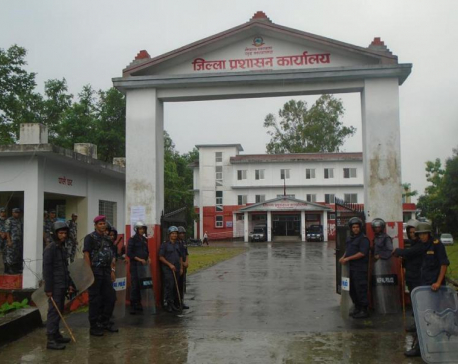
OR
MPs slam police bill for making CDO more powerful than CM
Published On: February 13, 2019 06:30 AM NPT
KATHMANDU: Ruling and opposition party lawmakers have come down heavily on the proposed Federal and Provincial Police Bill for making the chief district officers more powerful than the chief ministers.
During deliberations in the House of Representatives on Tuesday, former home minister Janardan Sharma, former general administration minister Rekha Sharma and other lawmakers from the ruling Nepal Communist Party (NCP) strongly protested the proposed bill for undermining the spirit of federalism.
Main opposition Nepali Congress (NC) leaders Bharat Shah, Sanjay Gautam and Amresh Singh criticized the draft bill for curtailing the rights of the provinces.
Federal Socialist Forum Nepal (FSFN) lawmakers Uma Shankar Argariya and Pradip Yadav flayed the government for entrusting more powers to the CDOs than to the chief ministers and internal affairs minister of the provinces.
“The bill has been drafted without studying the constitution . It is against federalism and cannot be accepted,” NCP lawmaker Sharma said venting his ire against the government. “The bill needs revision in much of its text as it curtails the rights of the province envisioned in the constitution and entrusts more authority to CDOs than the provincial governments.”
Former minister Rekha Sharma criticized the bill for trying to retain the provincial and local governments as units of the federal government. “The bill is not only against the spirit of the constitution but also contradicts provisions in different sections of it,” said Sharma.
Senior police officer turned NCP lawmaker Nawaraj Silwal opined that the power given to the CDO to mobilize both federal and provincial police ignoring the provincial government was inappropriate. “Province government is also an elected authority and the federal government should trust it,” he said.
NC leader and former state minister for finance Bharat Shah accused the draft bill of trying to render the province police as powerless as city police. “If all powers including investigations and filing of cases of all types is given to the federal police why do we need provincial police ?,” asked Shah. Terming the bill an anti-federalism move of the government, Shah said that federalism cannot materialize without empowering the provinces.
Former minister and NC leader Gautam vented his ire against the home minister for trying to keep the provincial police as units of federal police.
“The bill has entrusted all powers related to peace and security to the CDO and not to the provincial governments, which is a ploy to dissolve federalism,” said another NC lawmaker, Amresh Singh.
FSFN lawmaker Pradip Yadav took out a lollypop from his pocket during his address stating that it was given to him by Chief Minister of Province-2 Lal Babu Raut to present to the prime minister for not fulfilling promises made to the provinces. “Chief ministers are like army chiefs without any army. The bill has proposed making the CDOs new emperors with the chief ministers as their servants,” said Yadav.
Uma Shankar Argariya of FSFN also flayed the government for making the CDOs more powerful than the internal affairs ministers of the provinces. “Why should the government bear the expenses of the chief and other ministers of the provinces if the government doesn't provide them any powers?” asked Argariya. He was of the view that chief ministers should be as powerful in the province as the prime minister is at the center.
Responding to lawmakers' concerns, Home Minister Ram Bahadur Thapa defended the bill . “It is not the government that makes the laws, it is up to parliament to decide about the contents of any law. If the draft prepared by the government does not comply with the constitution then parliament can amend it,” said Minister Thapa.
He was of the view that given the unique feature of federalism being practiced in the country and security concerns due to the open border, the government has proposed assigning more authority to the federal police.
“There are campaigns for secession under the cover of autonomy and we should consider this while reorganizing the police,” said Minister Thapa.
You May Like This

New CDO says probe should have begun right after the incident
KANCHANPUR, Aug 26: The newly-appointed Chief District Officer (CDO) of Kanchanpur, Taranath Adhikari has said that the victim's family would have... Read More...

PM makes fun of MPs’ queries in parliament
NC Chief Whip Khand terms it objectionable ... Read More...

Commission gives MPs two days to agree on Province 2 local units
KATHMANDU, Dec 9: After protracted efforts to woo the agitating Madhes-based parties failed, the commission formed to restructure the local units... Read More...



Just In
- World Malaria Day: Foreign returnees more susceptible to the vector-borne disease
- MoEST seeks EC’s help in identifying teachers linked to political parties
- 70 community and national forests affected by fire in Parbat till Wednesday
- NEPSE loses 3.24 points, while daily turnover inclines to Rs 2.36 billion
- Pak Embassy awards scholarships to 180 Nepali students
- President Paudel approves mobilization of army personnel for by-elections security
- Bhajang and Ilam by-elections: 69 polling stations classified as ‘highly sensitive’
- Karnali CM Kandel secures vote of confidence















Leave A Comment